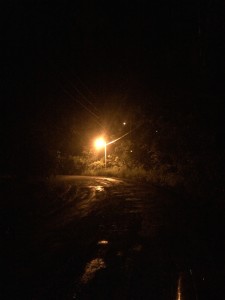A blog post from Living In a Blue Zone – a website dedicated to Dr. Smith and family’s adventures in Nicoya, Costa Rico.
Blue Zone: An area in the world where people live measurably longer lives. In these regions, people reach the age of 100 at rates ten times greater than those in the United States. Currently, there are 5 Blue Zones. Dan Buettner researched these and discovered their secrets to longevity.
Early to bed, early to rise, makes a man healthy, wealthy and wise” is how the old adage goes. I can remember hearing this very same mantra from my dad growing up. At the time, it was the last thing I wanted to hear, especially the morning after a late night party. But of course, as we mature and realize that late night parties take longer to recover from, and the consequences aren’t worth the actions, we can now appreciate those words.
So why is it that it’s so incredibly easy to follow the “early to bed” routine here in Costa Rica? I’m referring to the area we live in, Nosara. (My assumption is that things are probably different in the capital city of San Jose with more action and distraction.)
Because we are closer to the equator, the number of hours of daylight versus darkness is about 50/50. We don’t  have long summer days or long winter nights, and it’s easy for the body to accommodate this schedule. Your body naturally wants to be awake and active with the sun, and it wants to deactivate and rest during hours of darkness. Once it gets dark, your body begins to produce melatonin, which decreases cortisol (the “get up and go” hormone) which then readies you for sleep. When the sun goes down in Nosara, there’s not much artificial light. There are no rockin’ techno clubs with laser light shows. Let’s be real: it’s nearly impossible to drive at night around here because there are but a handful of street lights.
have long summer days or long winter nights, and it’s easy for the body to accommodate this schedule. Your body naturally wants to be awake and active with the sun, and it wants to deactivate and rest during hours of darkness. Once it gets dark, your body begins to produce melatonin, which decreases cortisol (the “get up and go” hormone) which then readies you for sleep. When the sun goes down in Nosara, there’s not much artificial light. There are no rockin’ techno clubs with laser light shows. Let’s be real: it’s nearly impossible to drive at night around here because there are but a handful of street lights.
We get to experience real nighttime darkness here! It makes it really challenging to stay up later than 9 p.m. In the United States, we are exposed to lots of artificial light after darkness. Our homes are well lit, and we have numerous electronic devices emitting light. All of it interferes with our circadian rhythms.
Another reason it seems so easy to have an early bedtime here is that you’re outside more and more physically active just because of the pace and way of daily life here. We don’t sit in air conditioning all day and then drive in air conditioned cars back to our cooled homes.
 At the end of the day here, I’m done. I’m tired. I’m ready to hit the bed. After all, in addition to the rising sun, the howler monkeys will make sure you don’t sleep much past 5 a.m. anyway.
At the end of the day here, I’m done. I’m tired. I’m ready to hit the bed. After all, in addition to the rising sun, the howler monkeys will make sure you don’t sleep much past 5 a.m. anyway.
Developing a consistent sleep schedule is crucial to overall health and wellbeing. It’s also a rampant problem in the United States. It affects all of your body’s systems. Sleep is the time when your body regenerates and repairs. Some of the health impacts of not enough sleep include disruption of your hormone balance, decrease in your immune functions, weight gain and difficulty losing weight, affected mental and emotional health, and loss of memory and the ability to learn.
If you continue to have issues with sleep, the cumulative effects can be severe.
And poor sleep habits aren’t limited to your routine before bed–poor sleep also evolves from the way you wake up in the morning. What do most Americans do when they wake up? They reach for coffee! An awkward sleep schedule combined with lots of caffeine is a recipe for adrenal fatigue. Your adrenals are small glands that sit atop your kidneys, and they’re responsible for the production of cortisol, epinephrine, nor-epinephrine, and several of the sex hormones. Stressed adrenals can manifest in a number of ways ranging from pure exhaustion to inappropriate emotional response, low libido, and greater symptoms of menopause or irregular menses. It’s a vicious cycle. The need for quality sleep is crucial for overall good mental and physical health.
Here are some things you can do to help establish a routine. First, stay consistent with your bedtime and your wake up time. If your schedule  is erratic, this will take some “forcing” initially. You may find it hard to go to bed early or wake up earlier. Start the bedtime process in advance. Avoid a large meal close to bedtime, and give your body a few hours to process dinner before going to bed.
is erratic, this will take some “forcing” initially. You may find it hard to go to bed early or wake up earlier. Start the bedtime process in advance. Avoid a large meal close to bedtime, and give your body a few hours to process dinner before going to bed.
You’ll also want to turn off all the lights in your home, and turn off cell phones, iPads, and computers; these devices all emit high amounts of blue light which inhibits melatonin production in your brain. Make your bedroom as dark as possible. Close the curtains and get the TV out of your room! Cover up or remove devices that create light. If you use your cell phone as a morning alarm, put it in airplane mode so that it shuts off cellular service and all alerts. You need to create an atmosphere that is conducive to sleep so that your body responds accordingly.
From a naturopathic medicine perspective, sleep is a non-negotiable. You need to create a routine that will get you the sleep you need. It’s absolutely foundational for great long-term health. We grow up thinking we need to do more, achieve more, stress more—and sleep less. There’s no pill, remedy, herb, or magical product that can replace great sleep! It’s a vicious cycle worth breaking…your health depends on it!

